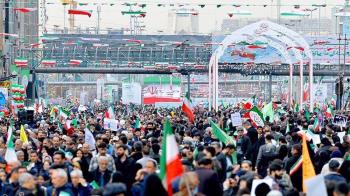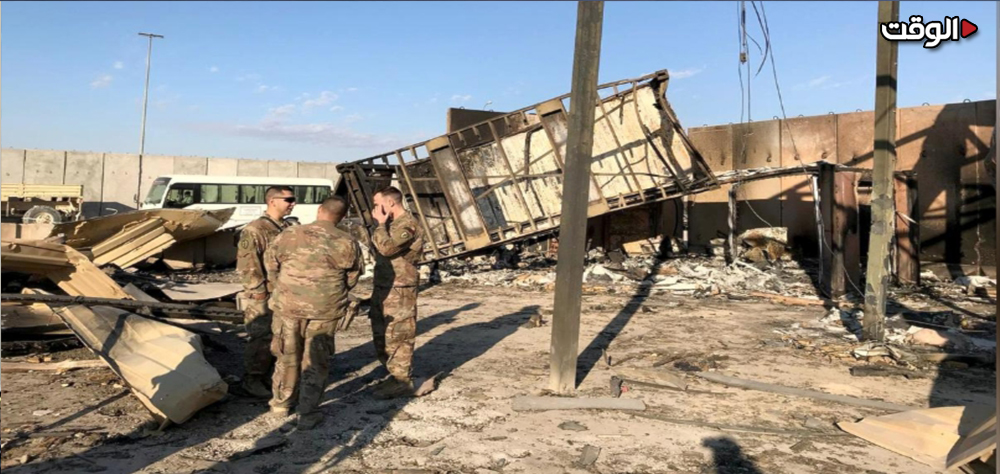Alwaght- As the Israeli attacks on Gaza continue, the fire of war intensifies on other fronts. While the Lebanese Hezbollah and Yemeni Ansarullah target the Israeli interests and positions in northern occupied territories and the Red Sea, a third front from Iraq is also active, undertaking the task of countering the US as the strategic ally of the Israeli regime.
Continuing their solidarity with Gaza people, Iraqi resistance groups in recent days have expanded the scope of their attacks on the American bases. In the latest action, they announced on Sunday that they targeted Harir military base hosting American occupation near the Erbil airport with drones. Also, the Iraqi resistance groups attacked three American bases in Al-Omar oilfield and Koniko gas field and Al Ramilan base in Hasakah province in Syria. Also, the Ain al-Assad base in Anbar province in western Iraq was targeted on Sunday night, triggering further American concerns.
The stepped-up attacks by Iraqi groups on American positions comes on the heels of American attacks on the headquarters of resistance groups in Iraq, during which several members of these groups were killed and injured. In response to these attacks, the leaders of Popular Mobilization Forces (PMF), a voluntary force formed in 2014 in opposition to ISIS terrorist organization following a fatwa by top Shiite cleric Sayyed Ali al-Sistani, in Iraq announced that they will avenge their martyrs and declared their determination to ramp up their escalation against the American occupation forces on their soil.
Two sources close to the Iraqi Hezbollah brigades told the New Arab news outlet a few days ago that the decision to intensify attacks on American bases in Iraq and Syria has actually been made.
“The escalation of attacks will include missile and drone attacks in response to the US attacks and the assassination of General Razi Mousavi in Damascus by the Israeli occupation,” their statement said, referring to a major Iranian anti-terror commander in Syria who decisively assisted anti-ISIS battle in Syria since the terror group emerged in 2014.
The Iraqi resistance groups’ insistence on continuing their attacks on American positions comes as since the initial weeks of Hamas’s Operation Al-Aqsa Storm, these forces joined the support campaign for Palestine and struck the American bases in Syria and Iraq, with figures suggesting that these attacks have already gone beyond 100.
The attacks are limited to the American forces and their primary goal is to put strains on the American side to change its positions concerning Gaza war. However, resistance commanders have said that if the US and Israel press ahead with their warmongering, war will expand to the whole region and that they are ready for any scenario.
American diplomat moves backfire
In the past three months, the American administration, through pressures on the Iraqi government, made many diplomatic moves and tried to convince the Iraqis to ease their attacks, but its political activism backfired, and as sources close to the resistance groups told New Arab, the talks between the Iraqi government and resistance forces stopped following attacks on the American bases.
Iraqi groups have warned that as long as the Israeli regime’s attacks on Gaza continue, their attacks against the American occupiers will not stop.
Prime Minister Mohammed Shia al-Sudani has made intensive efforts to defuse tensions between the resistance forces and the US, but at a time the Israeli go forward with their barbaric crimes and Washington openly backs them, the Iraqi public want to see Baghdad standing by the resistance camp.
The public opinion, along with the resistance groups, demand the withdrawal of the American occupiers from their country and ask the government to implement the parliament-approved expulsion law of the American forces as soon as possible. For this purpose, al-Sudani confirmed on Thursday in a meeting with his Spanish counterpart that the Iraqi government is moving in the direction of ending the presence of the US-led international coalition in Iraq, adding that its role should be purely for advising and assisting.
Over the past year, al-Sudani has tried to improve relations with Washington, but at the same time he was raised to power by the Shiite Coordination Framework (SCF) which is the top enemy to the American occupation, something putting the PM in a dire dilemma. Experts maintain that al-Sudani is now in a tough situation. If he chooses the US, he will lose his place in the eyes of the people and the resistance groups. If he picks the resistance groups, he may be slapped with American banking sanctions that would strain the Baghdad government’s financial resources.
On the other hand, Biden who wants to run for president again in November presidential election goes to great lengths to maintain the US military place in Iraq, but resistance leaders are resolved to expel the Americans forever. Biden left Afghanistan with dramatic humiliation and if this is repeated in Iraq, he will definitely lose the chance for reelection. In the meantime, the repeated attacks are perplexing the White House and it practically holds no plan to counter them.
The frequency of attacks on the US breaks the taboo regarding the empty American hegemony and makes the struggle against this declining hegemonic power a normal process. The scope of attacks on the US bases is not limited to the region, rather it expands to cover the image of American presence in any part of the world. By doing so, the Iraqis contribute to destruction of image of the global power of the US forces and military bases. An example of decline of the US global image is the frequent North Korean warnings that threaten the US with devastating nuclear attacks and are not afraid to make such threats.
Expansion of attacks to occupied Palestinian territories
Until recently, the attacks of the Iraqi groups have been focused on the positions of the American forces in Iraq and Syria, but these days the occupied territories are not immune to them.
Iraqi resistance groups on Sunday in a statement said that “we targeted Eilat in the occupied territories with drones in support of our Palestinian brothers.” Last week, a similar attack was conducted against Eilat.
The Iraqi attacks on Eilat port show that the resistance groups have joined the Yemeni front which over the part two months dealt heavy blows to the Israeli economy with its repeated attacks.
The CEO of the Eilat port recently acknowledged that Yemen’s attacks in the Red Sea have resulted in longer voyages for ships sailing to the Israeli port, something imposing high costs on the shipping companies. Cairo News network on Saturday published satellite images of Eilat, reporting that there is no ship in the Israeli port. Also, according to Israeli officials, tens of thousands of Eilat residents have already moved to other regions for the fear of Iraqi and Yemeni forces.
Therefore, if the Iraq and Yemeni resistance forces step up their operations against Eilat, the Israeli regime will have much to lose. After all, this port in southern Israel is one of its important ports and hosts almost half of its maritime trade, and if Gaza war goes longer, Tel Aviv costs will go way higher.
In fact, with their continuous attacks on American positions, the Iraqi resistance groups actually hit head of the snake that destabilize the region with its military presence and unconditional support to Israeli crimes. In other words, these attacks carry a message to Washington, telling it that blind support to Tel Aviv will not go unanswered.



























